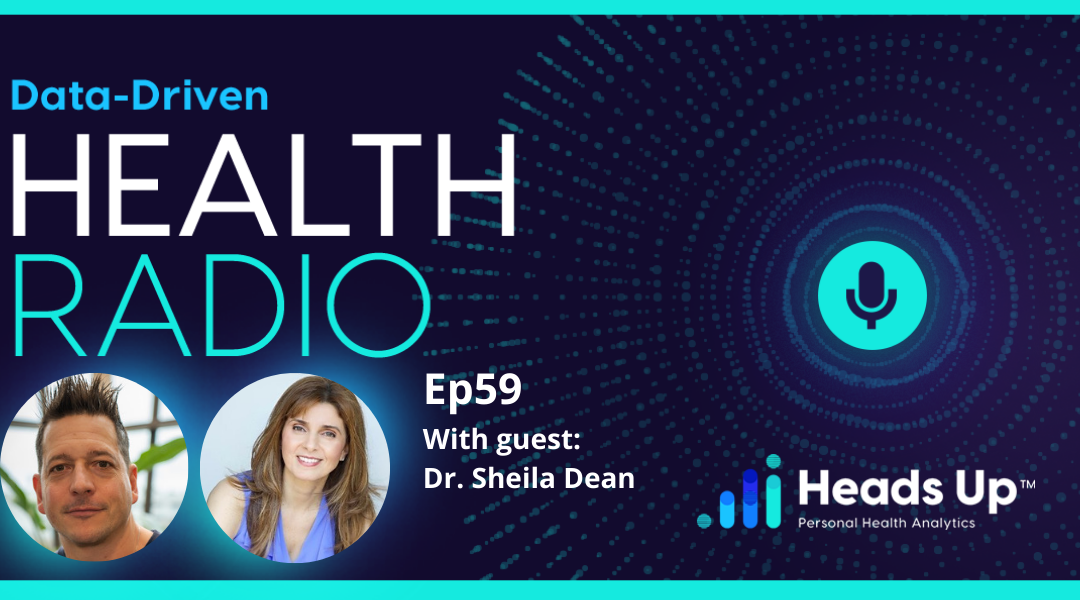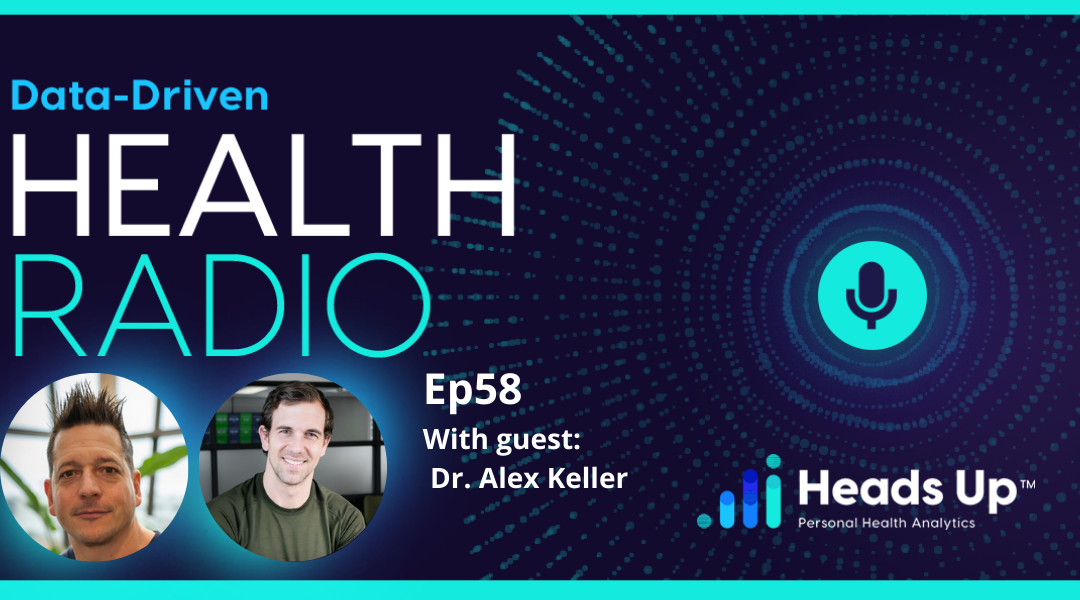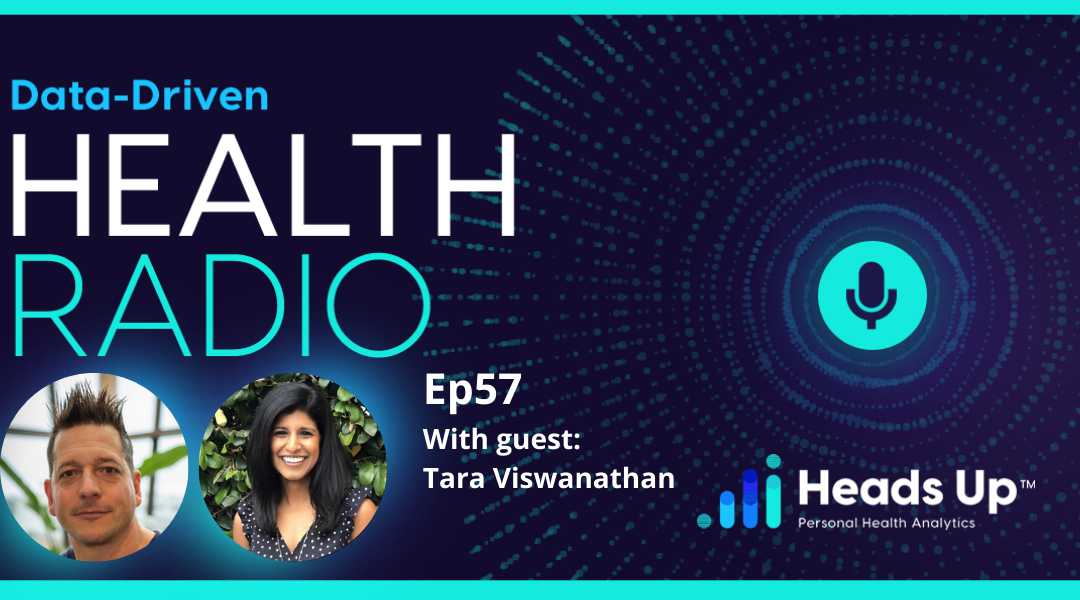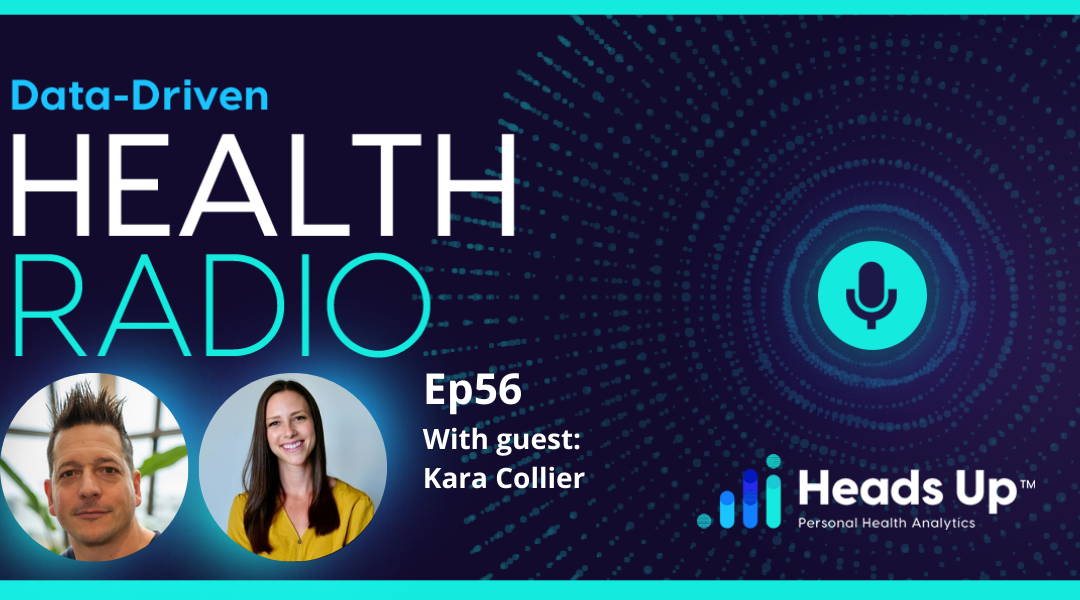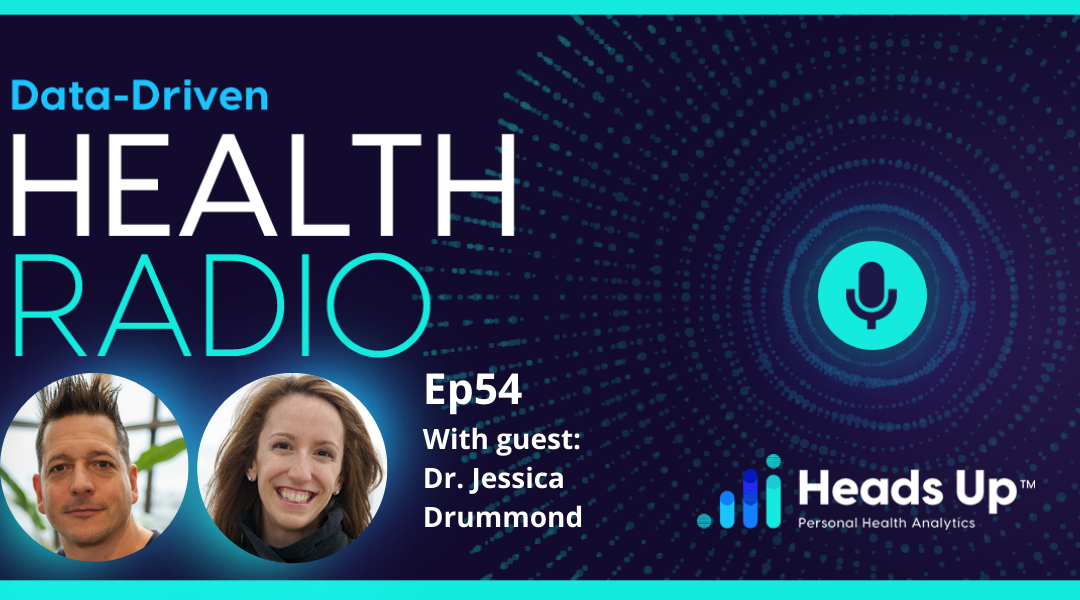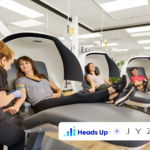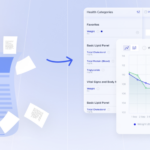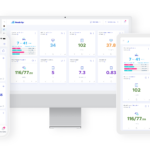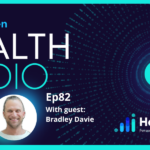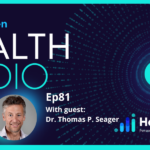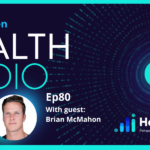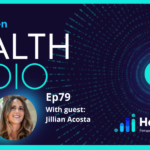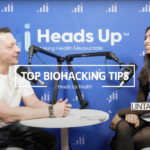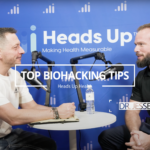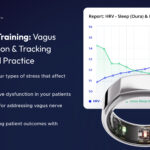Dr Jessica Drummond, MPT, CCN, CHC, is the founder and CEO of Integrative Women’s Health Institute (IWHI). An expert on chronic pelvic pain and endometriosis, Dr Jessica Drummond is also an evidenced based practitioner who understands heart rate variability (HRV), lifestyle parameters, and how to apply this information with her patients for better health outcomes.
If you’re a practitioner listening to this, you’ll learn how Dr Jessica Drummond transitioned her practice from in-person to, now with Covid, 100% virtual. She is one of the rare practitioners utilizing HRV and wearables such as Oura and Garmin in a clinical setting to measure her patients’ baselines to watch it improve over time. With her team of health coaches, she uses a “nervous system out approach” to help her patients calm their nervous systems and balance stress, while optimizing their functional nutrition, deep sleep, exercise, and more. Learn how Dr. Drummond and her team are using Heads Up’s practitioner’s portal to track their clients’ lifestyle and health metrics.
If you’re struggling with chronic pelvic pain or other issues related to women’s health, you’ll be inspired and motivated to reduce your stress, and learn why tracking any progress to celebrate may help your own health.
And if you’re considering becoming a board certified health coach, especially for women’s health, you’ll learn how Dr. Jessica Drummond’s unique program is the first of its kind, the only Women’s Health Coach Certification in the world with over 1500 people enrolled from over 60 countries!
Join Heads Up Founder, Dave Korsunsky, as he talks to Dr. Jessica Drummond about her unique approach to women’s health, her health coaching program, and even advice for those health practitioners new to transitioning into a virtual model.
Click on the button below to start your free 30-day trial. Or, read on for more information about our latest podcast episode!
-
How Dr. Jessica Drummond, Founder and CEO of Integrative Women’s Health Institute, first connected with Dave via their mutual friend, Aypril Porter, which led to a partnership between Dr Jessica using Heads Up with her own patients and program. [1:06]
-
About Dr. Jessica Drummond’s body of work, how she started the Integrative Women’s Health Institute over 11 years ago, and how from the very beginning, it was about training her colleagues in functional nutrition, lifestyle medicine, and the communication skillset of health coaching. [1:36]
-
How Dr. Jessica Drummond started her career, more than 20 years ago. First as a physical therapist, originally intending to focus on sports medicine in orthopedics because of her background as an athletic kid, but really quickly began to specialize in women’s health. [2:20]
-
How her focus on women’s health is from a physical standpoint. Basically, the muscular skeletal joints, muscles and nerves related to women’s health conditions. For example, shoulder injuries that happen after breast cancer surgery or rib pain, back pain, and pelvic pain associated with pregnancy, urinary incontinence, prolapse, etc. [2:40]
-
She did this for many years in a hospital based clinical setting, as well as outpatient practice [3:15]
-
How Dr Jessica Drummond discovered that the one population in women’s health that was particularly challenging was complex pelvic pain, sexual pain, or pelvic floor pain, pain in hips, back, radiation down the legs, organ structures, etc. [3:30]
-
Why anytime there is pain signaling, the nervous system is involved [4:00]
-
How she got sick in her early 30s and used the tools of functional nutrition to regain her own hormonal health. How pelvic pain can sometimes have a cyclical expression, and how to apply some things from a nutritional perspective to help her most challenging pelvic pain clients, using her own research around this [4:06]
-
What motivated Dr. Jessica Drummond to start building her own school. While working at a women’s specialty hospital in Houston, she began to teach her colleagues, offer courses, from the moment she began learning this information. [4:54]
-
That the Integrative Women’s Health Institute now has about 17 different courses and offers health coach certification that’s board-approved, with many certified health coaches come out of the program, focusing on women’s health. Not just in Dr. Drummond’s specialty, pelvic pain, but also fertility, perimenopause, period pain, and all kinds of women’s health issues. [5:14]
-
How Dr. Jessica Drummond has successfully shifted from a more in-person to 100% virtual now. [6:34]
-
Why she was ahead of her time, way before Zoom even existed, focusing on virtual appointments, telehealth, out of necessity. How she initially built a huge place in Houston, but switched to phone appointments, completely client-driven, eliminating unnecessary commutes to the doctor’s office. This also allowed her to fit in life as a parent raising young kids, as well as multiple moves (11 times in 13 years!). [7:00]
-
Advice for practitioners from Dr. Drummond if new to moving towards a digital model: why you should maintain your own office, even if it’s just a separate room in your home. [8:54]
-
Why is nutritional therapy so vital to health issues? How blood sugar dysregulation can be inflammatory? What does a functional nutrition template look like and how can it start the healing process? [9:28]
-
Dr. Jessica Drummond’s approach to functional nutrition: “It’s about optimizing systems. Instead of chasing the symptoms, we always say, optimize physiological systems.” [10:19]
-
Why Dr. Jessica Drummond is so interested in her patients’ heart rate variability (HRV). And why she takes a “nervous system out approach” instead of what she used to do, which is to start with digestion. That although digestion is used early in the process, she is realizing more and more that “calming the nervous system is so important to optimizing digestion function. Because you can’t absorb nutrients, calm digestion and general inflammation if someone is in chronic fight or flight.” HRV is the only way she “can objectively measure that.” [11:11]
-
On endometriosis, and how symptoms often begin for girls as young as 8 and 12 years old. How girls and women begin to learn to push that pain down and show up anyway. [11:27]
-
Why the number one reason girls miss school is due to period pain [12:09]
-
How many people learn how to push through the pain, to suppress it, and no longer can even recognize when they are physiologically stressed, which is again why HRV can be so valuable, whether looking at a Garmin, Biostrap, or Oura. “Now you’ve got an objective measurement that you can then start to make changes, which will allow you to use the nutrition therapy to calm the nervous system.” [12:16]
-
How using HRV can help you as a practitioner to spot those who have a sympathetic overload, then begin to use other strategies such as mindful eating, chewing. [13:40]
-
Why an anti-inflammatory diet is important, yet how to create flexibility in that plan as there is no one-size-fits-all endometriosis diet. Or pain diet. [14:00]
-
What she does with the majority of clients who have bloating digestive issues, starting with blended soups, cooked vegetables, etc. [14:42]
-
Why a lot of times, women are lacking absorbable protein, and struggle with low neurotransmitters. Not only do they have pain signaling because of inflammation, but they may have low serotonin, low tryptophan, L-theanine, and GABA support, not actually absorbing the protein they are eating. Why healthy beneficial fats are important, etc. [14:53]
-
Using the urinary organic acids testing to make sure that people are absorbing nutrients. [15:44]
-
Why Dr. Jessica Drummond starts with what people CAN eat, because if you have a lot of digestive issues, and you’ve been afraid of food since you were a ten-year-old girl (there are a lot of eating disorders), this is important. Eventually we’ll move away from inflammatory foods like sugar and dairy. But we focus on EXPANDING what they can eat, so they don’t feel like it’s a restrictive diet.[15:53]
-
On how the auto-immune paleo diet is kind of a backbone for most people, but it varies: some plant-based, some leaning towards keto. [16:53]
-
Why endometriosis has auto-immune properties, often co-morbid with lots of other auto-immune diseases. After endometriosis surgery, auto-immune markers tend to drop, which is important for fertility and overall health, and how Dr. Jessica Drummond tries to support that both pre-op and post-op to improve the immune system.
-
On Dr. Jessica Drummond’s published research around vulvodynia, her focus on gut healing, immune healing, restoring the small intestinal barriers, taking out those inflammatory and processed foods, how the vulvodynia never came back.
-
What auto-immune markers she looks for. And why you usually see co-morbid things like Hashimotos, thyroiditis, celiac disease, or elevated ANA. Sometimes associated with psoriasis or lupus. Or elevated thyroid antibodies. [18:50]
-
How with her virtual clinic, she does a personalized nutrition plan, potentially looking at the gut microbiome, using urinary organic acids testing, sometimes hormone tests, depending on the client’s needs. Why clients have twelve sessions of health coaching to help them implement behavior changes that can be challenging, disordered eating issues, anxiety. [20:22]
-
Another reason why tracking can be so helpful: “Because not only is it motivating, but for most women in our programs, they never feel like they’ve done it well enough. So being able to see good progress, to kind of look back and celebrate ANY progress, makes a difference.” [21:18]
-
When you’re someone who has had chronic pain for a long time, there’s always a focus on pain (i.e., when, how much, how often, what’s causing it). Instead she has her clients journal and track those times when they feel better. “That’s how we shift it by using the tracking to demonstrate more objectively how things are starting to improve.” [21:53]
-
How Dr. Jessica Drummond personally uses HRV and interprets it in a clinical setting with her clients, a basic explanation of HRV for those practitioners listening, and how some clients are already using wearables such as the Oura ring, Biostrap, Garmin, and already have access to their data. [22:25]
-
How she’s looking for that number (HRV) to increase over time. Why the Oura ring is a great option for those wanting to track their raw data. What during the day happened for that person to have a higher HRV during the night? And over time, from Day 1 of their program to Week 12, is that raising the baseline. Why they use in their clinic the Garmin, which gives biofeedback during the day, looking at the “Body Battery.” (But it doesn’t give the raw HRV data, unfortunately, right now.). [24:15]
-
How looking at HRV helps people to build associations themselves, which may not have been there before, a huge part of the process, empowering people to reconnecting to signals in their own bodies that they may otherwise not notice. [25:42]
-
Why it’s also important to teach people to get comfortable with being in some stress, knowing they’re going to recover. How she looks at HRV, exercise, but also Deep Sleep. [25:54]
-
The biggest things Dr. Jessica Drummond looks for. Over time, is that baseline HRV increasing? And if there’s a great night of sleep, what contributed to that so we can replicate it more? How much time in Deep Sleep, especially between 10pm and 2am, when your brain is recovering. During the day, is someone recovering from exercise? What may they be stressing them out that they’re surprised about? And what can we dial-in when it comes to nutrition, personalized to that particular client (example about client who thought she was eating healthy by choosing organic sugar but was still pushing her “into the orange,” which prompted them to look more into that). [26:40]
-
Alcohol and its impact on HRV (hint: it can be disastrous). And how it can be an important KPI to notice. [28:37]
-
About how work and general life stress impacts many of their clients who are women, especially right now with many simultaneously working from home and home-schooling their kids, how that is all being reflected in their numbers while in quasi-lockdown related to the Covid pandemic. [28:37]
-
Why tracking can be helpful during stressful times. “The good news is that when you start to track, people are motivated to do the recovery.” Example of her assistant who wasn’t able to change everything about her busy week, but found her own outlet to recover, restore and rejuvenate. For her, taking a hike helped her, in less than 3 days, go from a ‘8’ to a ‘100’ (body battery from her Garmin). How Dr. Jessica’s mode of recovery is clocking out at 5pm every day and meditating with her paddle board. How important it is for people to find what recovery looks like for them. [29:09]
-
Use cases of HRV in the clinical setting, how it’s mostly used in health and wellness high performance, yet how Dr. Jessica Drummond is using HRV in her clinical practice related to inflammatory issues is important, helping to encourage clients and reinforce positive behaviors, watching the baseline increase, a win for everybody. [30:30]
-
How a lot of her women clients are high achieving. And when they see their numbers not looking so great, they don’t like to accept it. So she and her team of health coaches will coach them through that. It’s also validating. We remind them that they are doing great, are talented and smart, yet whether it’s postpartum, post-op surgery, that their bodies need recovery for longevity. “Using these numbers are helpful for showing us what our body has to go through to really recover.” [31:45]
-
How Dr Jessica Drummond is starting to use Heads Up to get some data on her clients remotely. Dave and his team at Heads Up have started building customized dashboards for her and team of health coaches to collect those peripheral metrics. [33:17]
-
Why when it comes to chronic pelvic pain, it’s really important to collaborate with a skilled pelvic physical therapist as well. How important it is for people to really tune into the messages of their own bodies, to know when they’re physically relaxed, activated and strong, taking a holistic team approach, both conventional and integrative. [33:45]
-
How the Integrative Women’s Health Institute offers the only board certified health coaching program focused on women’s health. The program starts with the skillset of health coaching, helping people to have immediate buy-in, become excited about their plan to get healthy. Why this communication skill is new to most clinical professionals who are taught in their training to fix people as though they are mechanics. [34:27]
-
Why behavioral change is important; Dave mentioned other past podcast guests utilizing similar services in their clinics or programs, such as Brandy Wiltermuth of Three Health with medically supervised weight-loss and Dr. Sandi Scheinbaum who trains her health coaches to operate in that support role when it comes to lifestyle changes. [36:06]
-
How important it is for someone to want to take ownership of behavioral lifestyle changes and ask for help. While the nutrition and sleep plan is important, it won’t be executed without lot of support to making those lifestyle changes. Such as taking things off their plate and off their calendar. [38:05]
-
Ways to get in touch with Dr. Jessica Drummond and the Integrative Women’s Health Institute [40:30]
Want sustainable weight loss and better metabolic health for your clients? Take a page out of ThreeHealth’s playbook and learn how to start optimizing health outcomes now. Join the data-driven health movement and see why functional doctors, nutritionists and health coaches love to use our health data analytics and remote-monitoring platform to save time, attract more clients, and optimize their outcomes with ease.
